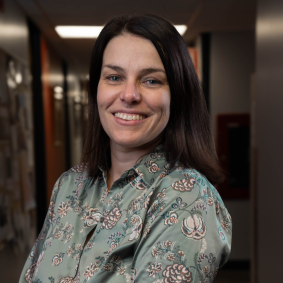Myriam Richard
Master's degree in Urban Studies (2012)
Professor, Department of Psychoeducation and Social Work, Université du Québec à Trois-Rivières
“This shaped my approach to research, which still guides me today: applied, multidisciplinary research that is connected to the field and deeply human.”
For Myriam Richard, her arrival at INRS was a happy coincidence. After spending a year in Russia as part of a university exchange program, she discovered a thesis written by a student supervised by Annick Germain at INRS on the Russian-speaking community in Montreal. Initially trained in history and seeking to address immigration issues from a more contemporary perspective, she contacted the professor, who agreed to supervise her project. At the same time, she joined the Chantier des histoires régionales (Regional History Project) as a research assistant. Upon her arrival, Myriam found herself both a student and a collaborator in a collective project—a dual role that she would have the opportunity to explore several times throughout her career.
Her master's thesis, which focuses on representations of the residential geography of immigrants from the former USSR in Montreal, examines exchanges on an internet forum where the community shared advice on housing and neighborhoods in the city. This project allows her to combine her interests in immigration, housing, and Russia, while developing a broader perspective on urban dynamics. His participation in the project Interethnic cohabitation in middle-class neighborhoods in Montreal, led by Annick Germain, is a milestone in his practical training in urban studies research.
What stands out most to Myriam about her experience at INRS is the closeness and richness of the research ecosystem. “It was extremely formative, both intellectually and personally. We learned about research by doing it, in an applied context, directly linked to the field and public policy.” She has particularly vivid memories of the collective work carried out with other members of the student and scientific community, in a stimulating environment with professional spaces where she could write and exchange ideas. ”Doing research together brings people closer," she says.
After completing her master's degree, Myriam initially continued working with Annick Germain, but felt the need to get closer to the field. Thanks to her supervisor's network, she became involved in a roundtable discussion dedicated to welcoming and integrating newcomers. This experience triggered a major career change. She realized that what interested her, beyond urban and historical contexts, were people and their life trajectories. She therefore turned to social work, a field in which she completed a new master's degree and then a doctorate.
Her research focuses on the experiences of refugees, particularly the impact of migration on family dynamics. She conducts field studies in Quebec and Lebanon, contributes to the development of intervention tools to support immigrant parents, and takes a keen interest in gender issues and the specific vulnerabilities of refugee families. She wrote a thesis on the experiences of separation and family reunification among refugees, drawing on transnational perspectives and a critical view of intervention practices. A postdoctoral fellowship in public administration then led her to work on a process of co-creating adapted services with young people from immigrant, refugee, and racialized communities.
Now a professor at the Université du Québec à Trois-Rivières, she teaches group intervention methodologies and hopes to further her research on migration, family diversity, and social intervention. Her time at INRS has given her a deeply practical approach to research: “It shaped my view of research, which still guides me today: applied, multidisciplinary research that is connected to the field and deeply human,” she summarizes.
His advice to current students is simple: seize every opportunity offered by INRS. “Take advantage of the proximity to scientists and exchanges with colleagues from diverse backgrounds. Listen to what everyone has to offer, explore, and benefit from the multidisciplinary approach.”
As for his wishes for the future, they reflect his commitment to society: “In a context of polarization and weakening of the social fabric, I hope that research will continue to be heard and useful, that it will retain a concrete impact, and that the scientific approach will be respected.”
[Interviewed in september 2025.]

